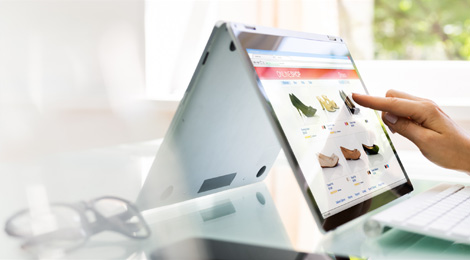The line between wholesale, retail and eCommerce continues to blur as more and more businesses are taking an omnichannel approach to selling products. Wholesale and distribution businesses now sell both B2B and B2C through eCommerce, marketplaces such as Amazon, at tradeshows and retail brick-and-mortar stores. Taking an omnichannel approach to selling allows your business to reach new markets and increase sales. As with any company in the industry of buying and selling inventory, those who sell specifically through retail channels require systems in place for managing products, tracking orders, picking, packing and shipping items and more. Retail ERP systems provide standard back-end inventory and accounting tools in addition to specialized features for the retail industry such as these 4 essential features: point of sale, CRM, warehouse management, and eCommerce integration.
Point of Sale
Point of Sale (POS) refers to a physical check-out counter location where customers can purchase goods and services. For omnichannel retail businesses, POS systems allow customers to place orders, submit payments and accept inventory while in-store. Although typically found in traditional retail brick-and-mortar stores, for businesses that sell through additional sales channels such as wholesale, tradeshows and eCommerce, POS is frequently used for front counter operations within a warehouse, for cash and carry type businesses, in showrooms or while exhibiting at tradeshows. Specialized features allow customers to pay on account and pay using multiple payment types and currencies. Many retail ERP solutions come with built-in, and fully integrated POS functionality.
CRM
Customer relationship management (CRM) tools allow businesses to track customers, vendors and prospects. Employees can easily bring up customer accounts or create new ones when dealing with customers in-store. This allows tracking of communication, loyalty points, customer service requests and product returns. Depending on your sales processes, you may benefit from retail ERP software with basic CRM functionality as opposed to needing to buy a sophisticated and standalone CRM system.
Warehouse Management
Warehouse management functionality helps employees easily manage inventory for wholesale and retail orders. Proper bin and shelf locations allow employees to quickly fulfil orders and help customers find products in-store. Inventory transfer features automate the process of moving products from one physical location to another to better serve customers in different geographical areas. This also accommodates the ability for customers to place orders online and then pick-up in-store.
eCommerce Integration
As part of taking an omnichannel approach, retail businesses are also selling online through B2B portals, B2C websites powered by platforms such as Shopify, marketplaces such as eBay and Amazon and customer-specific portals. Whichever channels you use, all information must be synced and integrated in real-time across the business. This prevents inventory from being sold online that was just purchased from retail locations.
In addition to the 4 essential features mentioned above, sophisticated retail ERP systems will also include other important tools for managing your business such as landed cost tracking, secure credit card processing, mobile apps for sales reps and robust reporting. If your business decides to sell through new retail channels, make sure you dedicate the time to finding an industry-specific system. And remember, the distinction between POS software designed specifically for retail stores and retail ERP software designed for those that also sell wholesale is important, as although both may offer similar features, they are geared towards different markets.










